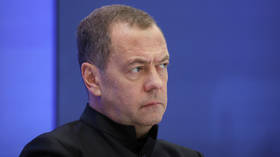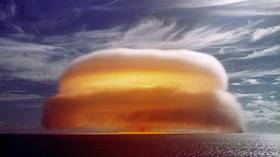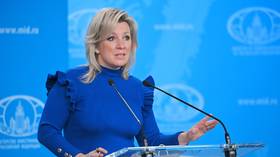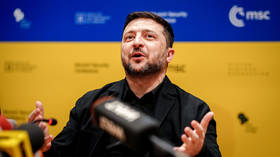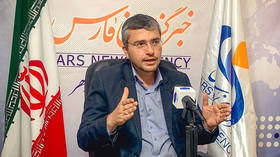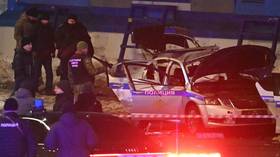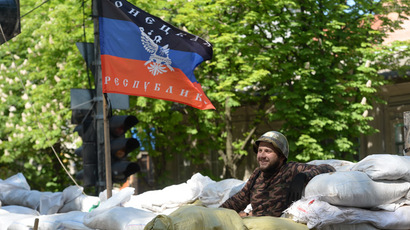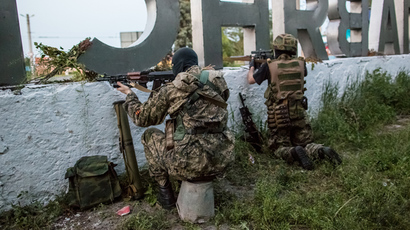Ukrainian MPs call for immediate troop withdrawal from country’s east
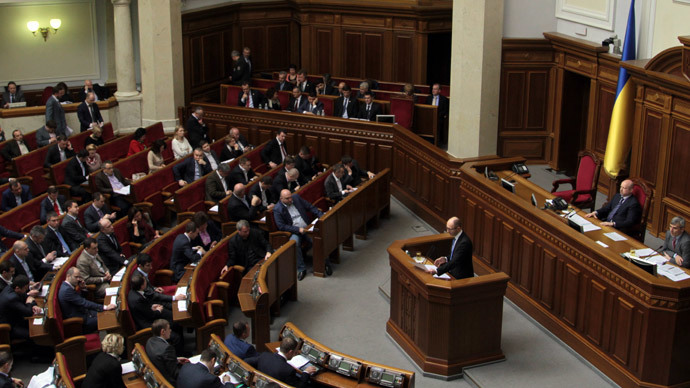
Ukrainian troops deployed in the country’s east should immediately return to their bases, the country’s parliament said in a memorandum. The freshly-adopted document also urges constitutional reforms based on the decentralization of Kiev’s power.
With 226 votes required to pass the law, the Ukrainian parliament finally adopted the so-called ‘Memorandum of Peace and Consent’, 252 MPs voting in favor. In particular, the document calls "to restore law, order and public safety in the state by stopping bloodshed and bringing to justice those responsible for the killings of civilians during mass protests; to stop the anti-terrorist operation in Ukraine’s southeast and return the soldiers involved in anti-terrorist operations to their places of permanent deployment.”
Kiev launched a military crackdown in the country’s south-east regions in April in response to mass protests against the coup-appointed government calling for the federalization of the region.
More autonomy
The adopted document also urges for immediate constitutional reform that will grant more autonomy to regions – a key demand of the protesters in the eastern regions of Donetsk and Lugansk.
As hopes for federalization grew thin, eastern regions created self-defense forces and seized government buildings. On May 11 referendums were held in Donetsk and Lugansk regions and independence was proclaimed.
Constitution to grant status of Russian language
The Verkhovna Rada voted after a debate concerning the wording of the article on the status of the Russian language. An agreement was reached after the “constitutional status of the Ukrainian language as the language of state” was confirmed.
The document said that the state “must ensure the rights of minority languages.” The document made a point "to grant the status to the Russian language," but stopped short from giving it the constitutional status.
Protests against new authorities in Kiev in the east were sparked after the Rada attempted deprive Russian of its status as an official language which was introduced by former president Viktor Yanukovich. The acting president vetoed the initiative, but in the end it grew into a global concern with the EU, UN and OSCE calling on Kiev to settle the issue.
Other provisions
The provision to grant amnesty to self-defense forces in the east was dropped from the final draft of the memorandum. This was harshly criticized by the Communist Party, who abstained from the vote.
MPs from the nationalist Svoboda Party abstained from voting on Tuesday as well, saying they believe the reform will be ineffective.
Further, the reform will provide for the country to drop its non-aligned status, allowing it to join any interstate union through a referendum.
Following the announcement, Russia said that if Ukraine’s authorities plan to implement all the reforms declared in the memorandum then they will finally be responding to Moscow’s calls.
"First, we have to see how it looks on paper. If this is true then it's the development we have been talking about over the past months,” said Deputy Head of the Russian Foreign Ministry Grigory Karasin, as quoted by RIA Novosti.
For months Moscow has been urging Kiev to deescalate tensions in the east, stop its military operation and hold an all-inclusive dialogue on constitutional reforms in Ukraine.
Russia, the US, the EU and Ukraine adopted a joint document on the de-escalation of the Ukraine crisis after talks in Geneva on April 17. Despite the agreement that included stopping violence in the country Kiev proceeded with the military operation in the east.


